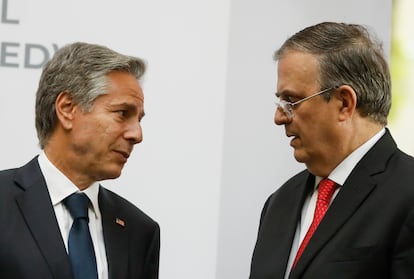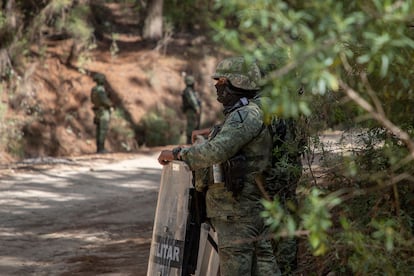White House on Mexico’s Defense Ministry leaks: ‘All governments are vulnerable to being hacked’
Ahead of a bilateral security summit, the cyberattack on the Mexican armed forces has revealed US cooperation against the cartels and the fight on fentanyl

The massive leak of four million emails from the Mexican Secretariat of National Defense (Sedena), which oversees the country’s army and air forces, has overshadowed a bilateral meeting on security issues that will be held between representatives of Mexico and the United States in Washington on October 13. In a telephone press conference regarding the meeting, two high-ranking US State Department officials sidestepped the controversy over the cyberattack targeting the Mexican military, although they did acknowledge that there is a risk that sensitive information will be exposed related to field operations. “All governments are vulnerable to being hacked,” said Ricardo Zúñiga, Special Envoy for the Northern Triangle in the Bureau of Western Hemisphere Affairs.
“There is always the danger that information will be leaked,” said Zúñiga in response to a question from EL PAÍS about how the leak of the emails, which has been attributed to the Guacamaya hacking collective, will impact the bilateral meeting, which forms part of the US-Mexico High-Level Security Dialogue between the countries. The meeting will take place at the US Department of State, and be headed by US Secretary of State Antony Blinken and Mexican Foreign Minister Marcelo Ebrard. Zúñiga has acknowledged that it is appropriate for the institutions and agencies of the United States and Mexico to discuss how they can “protect ourselves together” against common threats to cybersecurity.
Three of the six questions admitted at the press conference concerned the so-called Sedena Papers, also known as the Guacamaya Leaks. The stance of the administration of US President Joe Biden is to provide no further comment on the hack and not to air any specific concerns, at least in public. “Data leaks are a global problem,” said Assistant Secretary for the Bureau of International Narcotics and Law Enforcement Affairs Todd Robinson. Reporters also asked about the potential implications of the leaks in El Salvador, whose army was also exposed by Guacamaya. Robinson limited himself to stating that any actions to be taken would “depend largely on the specific case.”

Mexico-US fight against fentanyl
The priority topics of the bilateral security meeting will focus on regional security, drug trafficking and migration. Although the cyberattack carried out against the Mexican military monopolized questions from the press, US diplomats focused their message on specific threats, such as the trafficking of weapons and people across the border, as well as the influence of criminal organizations. High on that list of concerns is the fight against fentanyl, the substance behind a public health crisis that claimed more than 70,000 lives in the United States last year. The synthetic drug, which is 50 times more powerful than heroin, has also led to the increased sophistication of the criminal strategies of Mexico’s two most powerful drug-trafficking organizations, the Sinaloa Cartel and the Jalisco New Generation Cartel. “We must do more to address the threat of synthetic drugs like fentanyl,” Robinson said. “It is our main priority.”
Last weekend, EL PAÍS published a report on the war being waged by Washington and Mexico against fentanyl, based on the Sedena Papers. The leaked files detail exchanges of information between high-ranking members of the Mexican armed forces and personnel attached to the United States Embassy and intelligence work carried out against criminal organizations, which included intercepting signals and tracking coordinates in real time and spying on arms deliveries and drug shipments.
US authorities have reported the seizure of more than 10 million fentanyl pills in the past four months, while the Mexican armed forces have seized more than 15 million pills since Andrés Manuel López Obrador came to power in December 2018. Despite the Mexican president’s assurances that US agencies have played no part in major recent operations against organized crime, the size of fentanyl seizures and the capture of high-ranking cartel members suggest otherwise, and that cooperation between the two countries is ongoing even if it is being carried out discreetly. “The United States and Mexico work together,” Robinson said ahead of the US-Mexico High-Level Security Dialogue. “The relationship is fluid and strong.”
“Mexico serves as a strategic partner in the region,” said Zúñiga on the issue of migration, another priority on the bilateral agenda. The United States has said it is “pleased” with the cooperation of the López Obrador government to contain migratory flows, one of the most complicated issues of Biden’s presidency and that which has drawn the harshest criticism from the Republican Party. Tough policies on migration have also proved controversial in Mexico, where pressure from the White House has translated into stricter actions on the ground and provoked a shift in immigration policy compared to the early days of the López Obrador administration.
Tu suscripción se está usando en otro dispositivo
¿Quieres añadir otro usuario a tu suscripción?
Si continúas leyendo en este dispositivo, no se podrá leer en el otro.
FlechaTu suscripción se está usando en otro dispositivo y solo puedes acceder a EL PAÍS desde un dispositivo a la vez.
Si quieres compartir tu cuenta, cambia tu suscripción a la modalidad Premium, así podrás añadir otro usuario. Cada uno accederá con su propia cuenta de email, lo que os permitirá personalizar vuestra experiencia en EL PAÍS.
¿Tienes una suscripción de empresa? Accede aquí para contratar más cuentas.
En el caso de no saber quién está usando tu cuenta, te recomendamos cambiar tu contraseña aquí.
Si decides continuar compartiendo tu cuenta, este mensaje se mostrará en tu dispositivo y en el de la otra persona que está usando tu cuenta de forma indefinida, afectando a tu experiencia de lectura. Puedes consultar aquí los términos y condiciones de la suscripción digital.









































